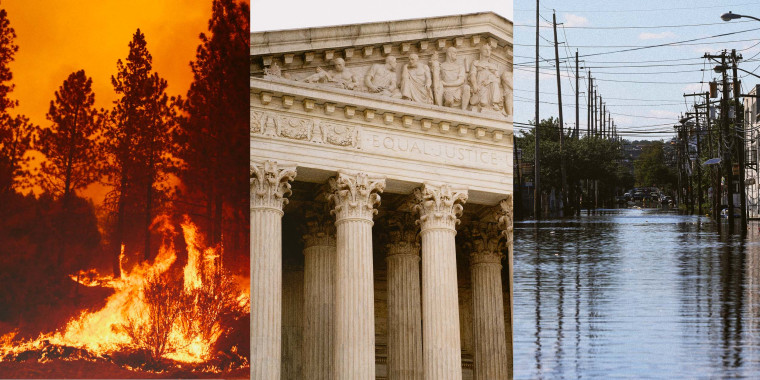A climate change activist who set himself on fire in an apparent act of protest against inadequate climate change policies in the U.S. died over the weekend.
Wynn Bruce, 50, self-immolated in front of the Supreme Court on Friday, which was Earth Day. He died from his injuries Saturday.
Kritee Kanko, a climate scientist who described herself as Bruce’s friend, tweeted Sunday that he died "to bring attention to climate crisis." She said he had been planning the act for at least a year.
Bruce’s death followed a cascade of unnerving climate reports. Though we don't know what other factors may have played a role in Bruce’s decision, his death prompted discussions regarding the deep impact the perpetual climate crisis can have on people’s psyche.
A recent report from the United Nations' Intergovernmental Panel on Climate Change said the time is “now or never” for the world to stave off global warming and reduce the most harmful effects of climate change. When the report dropped earlier this month, U.N. Secretary-General António Guterres decried “a litany of broken climate promises” from world leaders.
That report came during a time when climate catastrophes and their resulting conflicts are mounting across world, from fights over water access in the United States to mass migration sparked by droughts, floods and hurricanes.
At the same time, Russia’s invasion of Ukraine and the skyrocketing price of gas resulting from sanctions against the oil-rich aggressor show the world's dependence on gas isn't waning.
Experts in recent years have sounded the alarm on “climate grief.” The phenomenon was explained in an NBC News report in 2018:
The increasing visibility of climate change, combined with bleak scientific reports and rising carbon dioxide emissions, is taking a toll on mental health, especially among young people, who are increasingly losing hope for their future. Experts call it “climate grief,” depression, anxiety and mourning over climate change.
Psychology experts have long recognized the role climate plays in mental health. A 2017 report from the American Psychological Association found “the psychological responses to climate change, such as conflict avoidance, fatalism, fear, helplessness, and resignation are growing.”
Despite the U.S. taking some steps to stem the tide, it’s hard not to see the country's response to climate change generally fitting that description.
It’s possible there were many contributing factors that led to Bruce’s death. But we can’t rule out that he could be a tragic example of climate fatalism.
The country writ large seems to be stricken with various forms of climate grief. A 2020 Pew Research Center poll found two-thirds of Americans think the government should do more to curb climate change. Still, a Pew poll published last month found a majority of Americans believe the world won't do enough to avoid climate change's worst effects.
That prompted climate expert Edward Carr, who co-authored the recent U.N. report on climate change, to tell NBC News he’s “a little concerned the narrative of fear around climate change, which grabbed people’s attention, has crossed the curve and become disempowering.”
He makes a good point. Climate change is a harrowing ordeal to grapple with. The task for U.S. officials is to frame the issue as one that Americans can still influence for the better and to demonstrate this by offering policies that will make a significant impact.
If you or someone you know is in crisis, call the National Suicide Prevention Lifeline at 800-273-8255, text HOME to 741741 or visit SpeakingOfSuicide.com/resources for additional resources.
Related:

